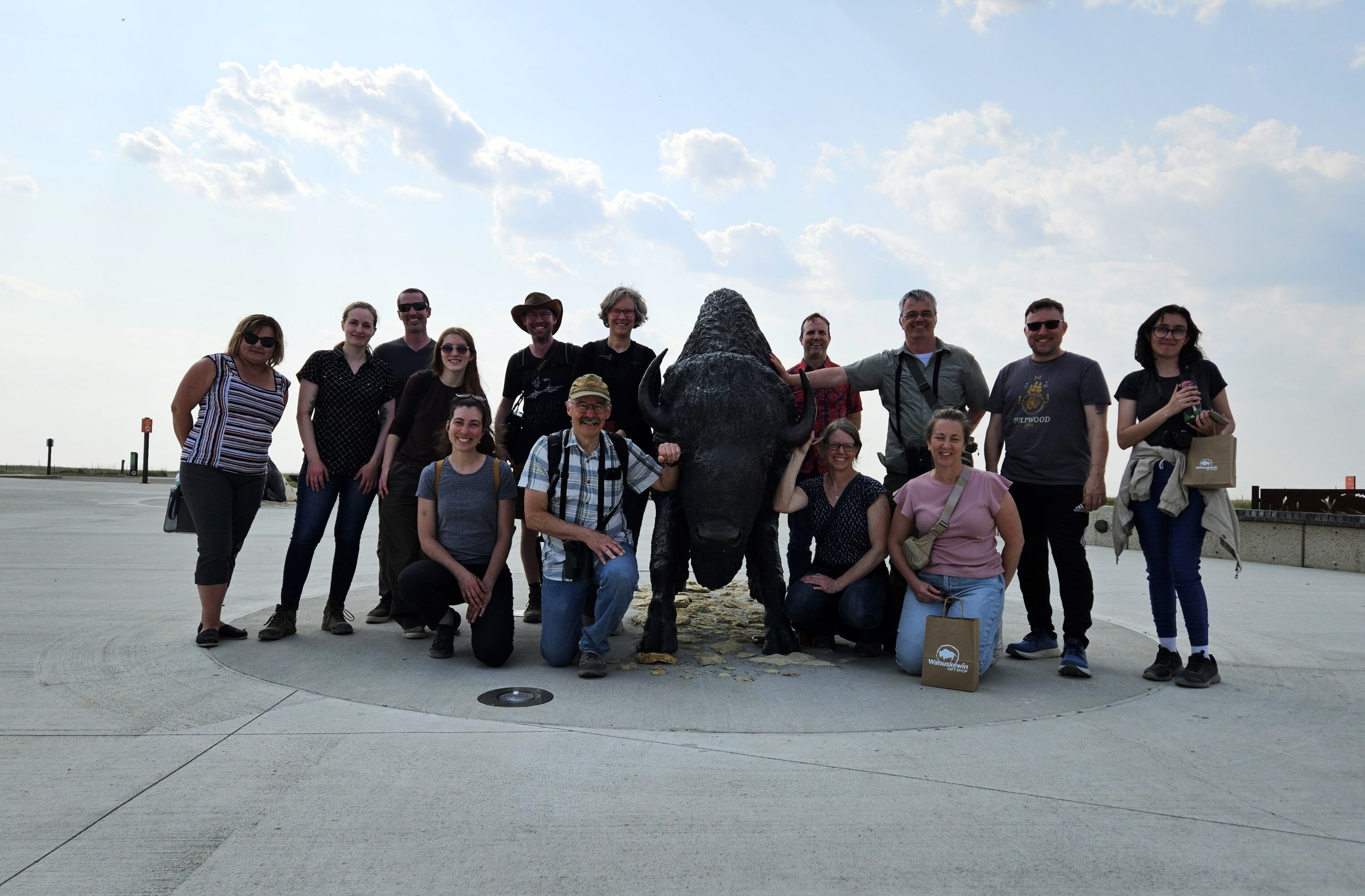The Canadian Wildlife Health Cooperative (CWHC) convened in Saskatoon from June 3–5 for the 2025 Annual General Meeting (AG M), bringing folks from our regional centres across the country. Hosted by the Western/Northern regional centre, this year’s AGM offered a brilliant mix of presentations, collaborative discussion, and group activities.
M), bringing folks from our regional centres across the country. Hosted by the Western/Northern regional centre, this year’s AGM offered a brilliant mix of presentations, collaborative discussion, and group activities.
As a cooperative, we work together every day virtually, but there’s nothing like bringing folks together to be in the same room.
Celebrating Regional Impact
Each of CWHC’s regional and national offices shared key highlights from the past year, illustrating the breadth and depth of wildlife health activity across the country. Really important and interesting work happens at each of our centres, from CSI-like determination of why particular animals have died, to fascinating work on improving how we share and integrate wildlife health data. From marine mammal investigations to amphibian health programs, participants reflected on successes, challenges, and opportunities for growth. In particular, several themes emerged that sparked important dialogue and planning for the future.
Key Conversations
Throughout the AGM, staff and partners engaged in forward-looking discussions on several interesting topics:
- Bat Health Programming: Jordi Segers discussed updates and future directions of the CWHC Bat Health Program, underscoring the role of the program in supporting bat health and conservation in Canada.
- Wildlife Health Graduate Course : The group discussed a potential effort to develop a graduate-level wildlife health course to be delivered nationally. This will strengthen Canada’s future capacity through interdisciplinary training.
- Ethical, Legal, and Safety Considerations of public submission of specimens: Discussions addressed how best to manage public submissions of sick or dead wildlife, ensuring safe and respectful integration of citizen science into our surveillance systems.
- Approach to working in northern Canada: participants exchanged ideas on how to strengthen CWHC’s approach in northern Canada, with an emphasis on collaborative, culturally grounded partnerships with communities.
Activities
 The AGM included unique opportunities to learn from local institution participants toured the Vaccine and Infectious Disease Organization (VIDO), gaining insight into Canada’s world-class research capacity in zoonotic and emerging pathogens. The event concluded with a field trip to Wanuskewin, a National Historic Site that offers a deep connection to Northern Plains Indigenous culture and history. This experience grounded our work in the broader context of land, people, and the long-standing relationships that shape wildlife and human health alike.
The AGM included unique opportunities to learn from local institution participants toured the Vaccine and Infectious Disease Organization (VIDO), gaining insight into Canada’s world-class research capacity in zoonotic and emerging pathogens. The event concluded with a field trip to Wanuskewin, a National Historic Site that offers a deep connection to Northern Plains Indigenous culture and history. This experience grounded our work in the broader context of land, people, and the long-standing relationships that shape wildlife and human health alike.
Honouring Excellence: Lenny Shirose Receives CWHC Innovation Award
A highlight of each AGM is the presentation of the CWHC Innovation in Collaboration and Research Award. This year, we proudly recognized Lenny Shirose of the Ontario/Nunavut regional centre for his outstanding leadership and lasting contributions.
Lenny began his journey with CWHC as a wildlife technician in 2005 and has since become a cornerstone of the ON/NU team. Renowned for his precision with data, support for students and researchers, and quiet leadership, Lenny has enabled the translation of surveillance data into impactful research and partnerships. His work has contributed to peer-reviewed publications and advanced CWHC’s scientific profile.
One of his most notable achievements is his work to develop the Canadian arm of the Student Network for Amphibian Pathogen Surveillance (SNAPS). This initiative engages students, researchers, and government in collaborative amphibian health monitoring. From developing protocols to managing logistics and results, Lenny has led SNAPS with energy and vision. The program has filled a critical gap in national amphibian surveillance. SNAPS not only strengthens surveillance capacity, but also brings fresh perspectives and partnerships into the CWHC network. Without question, this program would not exist in Canada without Lenny’s commitment, creativity, and drive. His recognition is well deserved, and we celebrate his embodiment of the spirit of collaboration and innovation that defines our collective work.
The Power of Relationships in a Changing World
A central theme of this year’s AGM was the enduring importance of relationships. As CWHC navigates a changing world, our strength lies in the connections we foster across institutions, disciplines, and regions. In his opening remarks, CEO Damien Joly emphasized that while programs and policies may evolve, it is the people we collaborate with who form the backbone of effective, lasting change. The CWHC remains committed to relationship-building as a strategic priority. These connections do not just support our work, they define it.
institutions, disciplines, and regions. In his opening remarks, CEO Damien Joly emphasized that while programs and policies may evolve, it is the people we collaborate with who form the backbone of effective, lasting change. The CWHC remains committed to relationship-building as a strategic priority. These connections do not just support our work, they define it.
The AGM remains an essential tradition at CWHC. It is not just a time to reflect and plan, but a chance to connect in person, reinforce our shared mission, and grow stronger together. Each year, these face-to-face interactions deepen the trust and collegiality that make the CWHC network truly national in scope and spirit.
Our sincere thanks go to the Western/Northern team for hosting an exceptional gathering that brought us together, a national network of wildlife health expertise, but more importantly, individuals who care deeply about wildlife and wildlife health.

